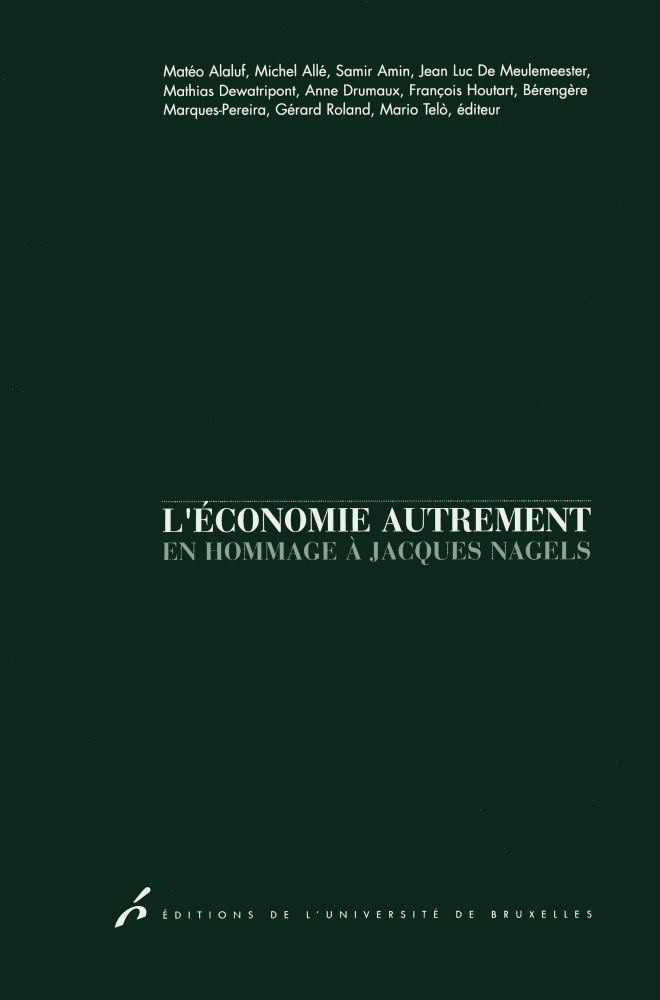L'économie autrement
En hommage à Jacques Nagels
Première édition
Quelles marges pour une recherche économique, sociale et politique alternative, dans le cadre de l’économie globalisée, de ses contradictions et des mouvements qu’elle suscite ? Le présent ouvrage analyse les enjeux de l’"économie autrement" et fait écho aux débats suscités par ce fil rouge qui traverse les neuf chapitres. Lire la suite
C’est aussi et avant tout un hommage rendu par un groupe de collègues et d’amis à un homme qui a consacré une partie importante de sa vie à l’Université libre de Bruxelles. Jacques Nagels a symbolisé, durant quatre décennies, la défense active de l’université publique et laïque, l’innovation au sein de cette institution, ainsi que sa démocratisation.
Le caractère multidisciplinaire du livre reflète la grande ouverture d’un économiste politique, internationalement reconnu, qui a anticipé certains aspects de la moderne international political economy : l’attention portée aux racines économiques des enjeux politiques ainsi que les implications politiques des changements économiques.
Le tournant de 1989 et l’effondrement du communisme en Europe ont permis à Jacques Nagels, de réactualiser la référence critique à la pensée de Marx, de se focaliser sur l’analyse empirique des changements de l’économie globalisée et, au-delà, de contribuer à la remise en question des nouvelles orthodoxies à la mode depuis les années quatre-vingt-dix.
Spécifications
- Éditeur
- Éditions de l'Université de Bruxelles
- Auteur
- Mateo Alaluf, Michel Allé, Samir Amin, Jean-Luc De Meleumeester, Mathias Dewatripont, Anne Drumaux, François Houtart, Bérengère Marques-Pereira, Gérard Roland, Mario Telò,
- Édité par
- Mario Telò,
- Préface de
- Mario Telò,
- Honored/dedicated to
- Jacques Nagels,
- Langue
- français
- Site web ressource
- Oapen.org
- Catégorie (éditeur)
- > Business & Économie
- BISAC Subject Heading
- BUS000000 BUSINESS & ECONOMICS
- Code publique Onix
- 06 Professionnel et académique
- CLIL (Version 2013-2019 )
- 3305 SCIENCES ECONOMIQUES
- Subject Scheme Identifier Code
- Classification thématique Thema: Théorie et philosophie économique
ePub
- Date de publication
- 14 avril 2020
- ISBN-13
- 978-2-8004-1702-8
- Contenu du produit
- Text (eye-readable)
- Ampleur
- Nombre de pages de contenu principal : 568
- Code interne
- 1702
- ONIX XML
- Version 2.1, Version 3
Google Livres Aperçu
Sommaire
- Foreword
- CHAPTER I – The Ambivalences of the International Legal Order
I. International law – A great story?
II. Is international law "law"?
III. Who can interpret international law and how?
- PART ONE – The subjects of the International legal order
- CHAPTER II – The Creation of States
I. Is statehood a question of fact? The theory of constitutive factors and its ambiguities
II. The creation of a state: a question of law?
III. Declaratory or constitutive recognition of states?
IV. State succession: what role does law play?
- CHAPTER III – State Borders
I. Agreement as the fundamental criterion for delimitation: the relative character of borders
II. The principle of uti possidetis juris: a substitute for agreement?
III. The case of maritime and spatial frontiers: sea and space, "common heritage of mankind"
- CHAPTER IV – The Exercise of Sovereignty
I. Sovereignty framed by law: a paradox?
II. The national jurisdictions of states confronted with requirements of cooperation
III. The principle of non-intervention: a general limit to states' exercise of their sovereignty?
IV. Immunities as specific limits on the exercise of sovereignty: between the interests of states
and aspirations to a universal morality
- CHAPTER V – International Organizations
I. The definition of international organizations and their legal personality: institutions per se
or merely the product of agreements among states?
II. The powers of international organizations: attributed by states or autonomous?
III. The United Nations, embodiment of the international community?
- CHAPTER VI – Private Persons
I. The development of human rights: the scope and limits of universality
II. The mechanisms of implementation: beyond the state?
III. The development of obligations for individuals: a law of the "international community"?
- PART TWO – The Sources of International Law
- CHAPTER VII – Custom
I. The place of custom in the system of sources of international law: the tension between
voluntarist and objectivist approaches
II. The constituent elements of custom: how can fact become law?
III. The evolution of custom: the paradoxes of a source that is both dynamic and stabilizing
- CHAPTER VIII – Treaties
I. The definition and validity of treaties: is agreement a construction?
II. The conditions of conclusion, termination, or suspension of treaty obligations:
an objective regime?
III. The principle of the relativity of treaties and its limits
- CHAPTER IX – Other sources of international law
I. Unilateral declarations: an autonomous source?
II. The acts of international organizations: secondary law?
III. The "general principles of law": an autonomous source?
IV. Judicial precedent and legal writings: "subsidiary means for the determination of
rules of law"?
- PART THREE – The Implementation of International Law
- CHAPTER X – International Law and War
I. The scope of the prohibition of the use of force: jus contra bellum or jus ad bellum?
II. Self-defence as an “inherent right”?
- CHAPTER XI – International Responsibility
I. Difficulties in attributing conduct to a state
II. Recognition of “circumstances precluding wrongfulness”: a confirmation of realism?
III. The random implementation of international responsibility
IV. The limited responsibility of international organizations
- CHAPTER XII – Peaceful Settlement of Disputes
I. An autonomous legal principle?
II. A sovereign body of law: a free choice between peaceful means of settlement?
III. Limitation by law? The International Court of Justice as a universal court
IV. The development of means of dispute settlement and areas of international law:
towards a fragmentation of international law?
- List of Maps and Illustrations
- Selective Bibliography

